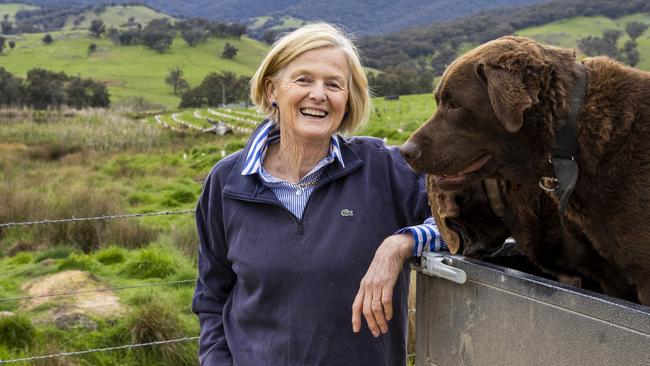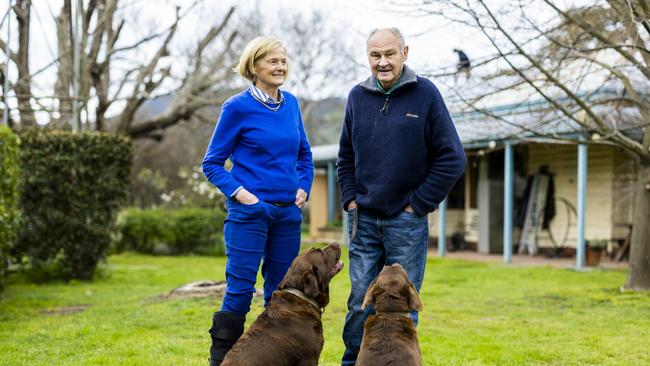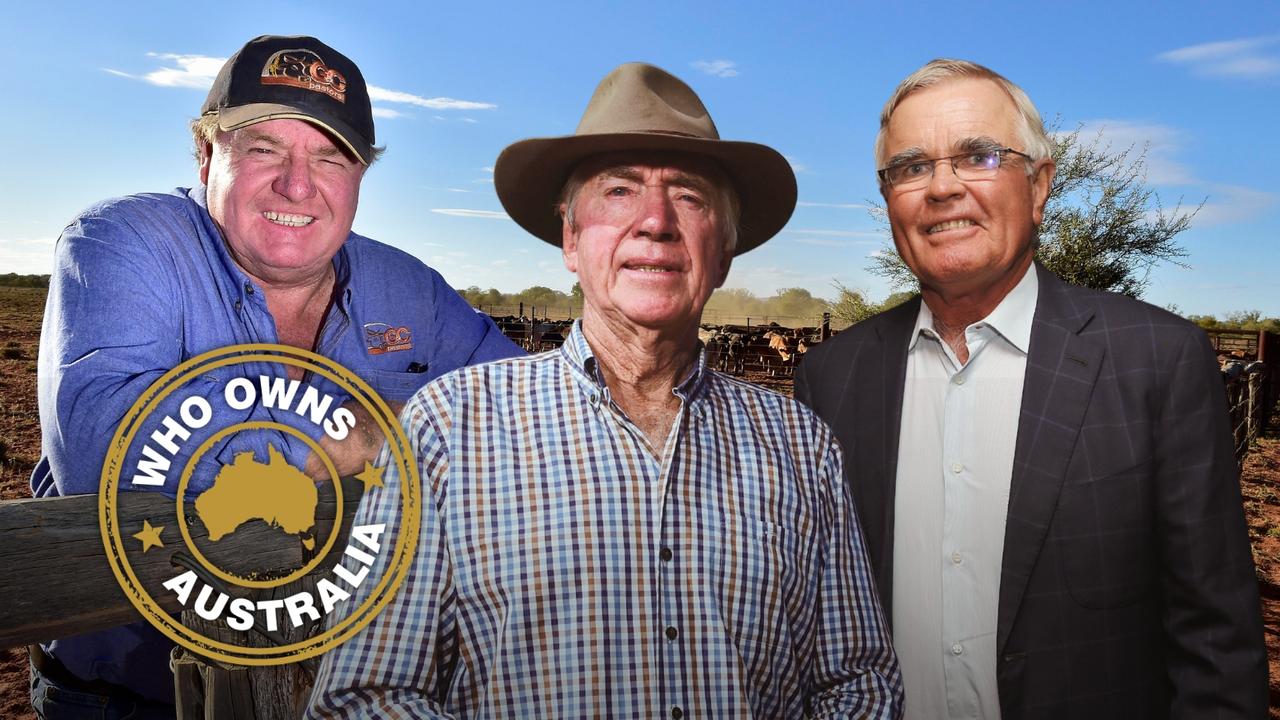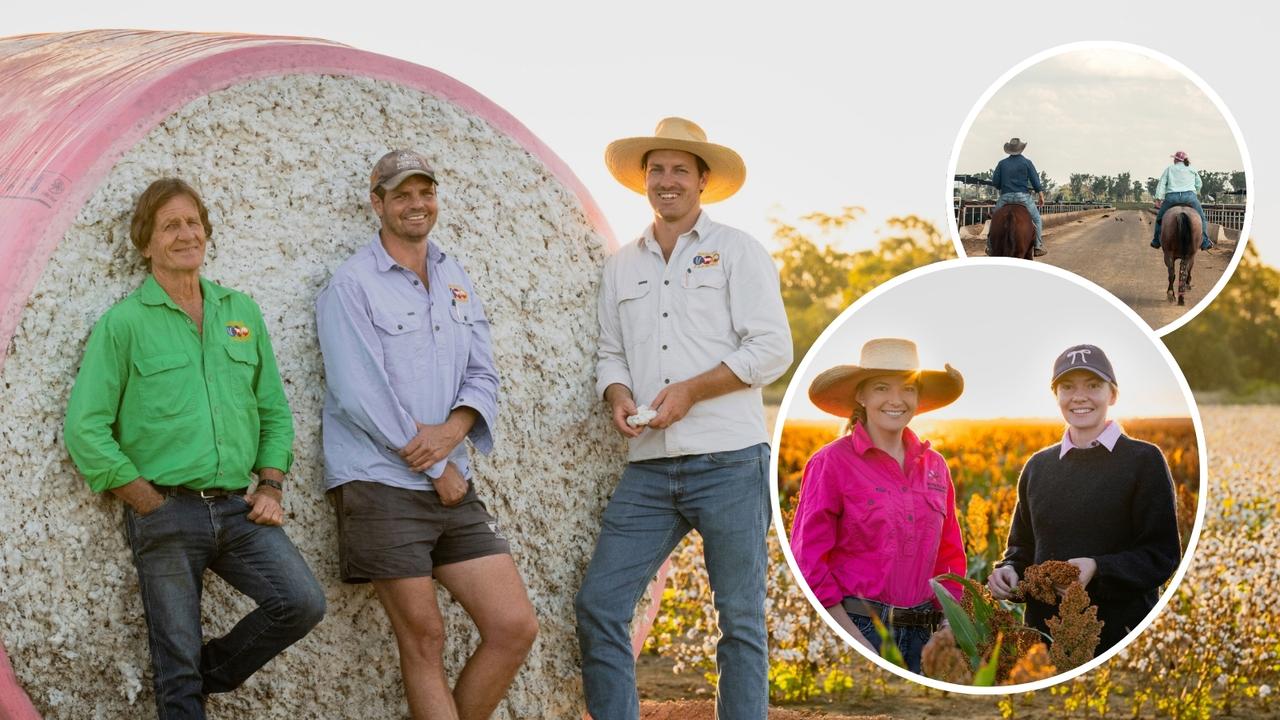Lucinda Corrigan, Rennylea Angus: Australia’s queen of sustainable cattle farming
The woman behind Rennylea Angus’s extraordinary growth is also a driving force behind the red-meat sector’s ambitious climate action plan.
Turn the time clock back. The year is 1983.
A young Lucinda Bell, recently graduated in agricultural science, is incongruously farming 4000 wild goats brought in from the outback among the rolling green foothills of the NSW Snowy Mountains near Adelong.
The ambitious plan is to rear, select and breed as many as one million new “designer” goats from the genetically robust feral stock that freely roam the arid sheep stations of far western NSW, to create a valuable new cashmere fibre industry in Australia.
But despite the backing of Scottish luxury cashmere and speciality fibre business, Dawson International – looking for a new source of raw cashmere down after China decided to stop exports and process its own fibre – many more seasoned agricultural heads than Lucinda Bell’s simply said it couldn’t be done.
They scoffed at the idea of established pastoralists and graziers choosing to run unproven, unruly and “smelly” cashmere goats at a time when the sheep industry was enjoying high wool prices (the wool price scheme crash was still seven years away) and the cattle industry was thriving.

Especially not at the behest of a green young girl, however enthusiastic and persuasive, fresh out of the University of Sydney and hailing from the city’s privileged eastern suburbs.
But little did they appreciate the background, determination and genetic selection skills of one Lucinda Bell.
Born and bred on a sheep station, Noonameena, on the eastern Hay Plains near Darlington Point, it was only the sudden death of her father in 1969 (Bell was 12) that forced the family – her mother, three sisters and one young brother – to move to the harbourside city, after the family farm was sold to pay death duties.
“From that moment, everything I did was about plotting a way back to the country, back to the bush” says Lucinda (now Corrigan), now 65, still impressed by her own youthful single-mindedness when her mother wanted her to become a teacher or nurse.
“I felt like a fish out of water in Sydney; so when I was offered the job after uni working for Dawson at Kinross Cashmere Company (Adelong), selecting and breeding the goats for such an interesting project, it was exactly what I had been looking for.”
Lucinda says working with the fledgling cashmere industry – she later became CEO of the newly formed Australian Cashmere Growers Association – also made her realise it was helping change community attitudes and shift ingrained narrow-thinking that most spurred her on.
“In hindsight, I think I was very lucky knowing what I wanted to do from such a young age. And finding out I was good at it.
“I also never doubted that there was a massive future in farming, as every country needs to ensure it has sustainable agricultural production systems to secure its food.
“But I also realised early on that what I’m really interested in is change, but only in a macro, practical industry sense; I’m not talking about politics here. If I can help take an industry forward with science, innovation and getting research to work better for producers, that’s what I want to achieve in my life.”

Fast forward nearly 40 years.
It is August this year and an accomplished and highly respected Lucinda, along with her husband Bryan, is enjoying a stellar spring bull sale at the helm of their nationally renowned Rennylea performance-based DNA-evaluated cattle genetics business.
In just four hours, 212 young Angus bulls are sold for $4.8 million – with a top price of $65,000 and averaging $22,530 a bull – to leading commercial cattlemen and corporate herds scattered across Australia.
(A down-to-earth Bryan Corrigan, 72, later shakes his head at the “ridiculous but amazing” prices being paid by producers for their prime genetic stock, as the Australian beef industry enjoys its third year of phenomenal seasons.)
Lucinda is by now a former board member of Meat and Livestock Australia, founding president of Farmers for Climate Action and chair of the Armidale-based Australian Genetics and Breeding Unit which oversees the vital national cattle Breedplan and performance based Estimated Breeding Values system.
She is also chair of the national Sheep Industry Sustainability Framework, on the board of Genetics Australia, an ex-director of leading e-fencing agtech company Agersens, and a key figure in the world of Australian agribusiness.
In the 36 years she has been married to Bryan – they met in nearby Holbrook when she was leading the cashmere goat push and he was running a small fourth-generation family farm in southern NSW near Albury – Corrigan’s world, and the bigger agribusiness and cattle industry scene in which she operates, has changed dramatically.
From running a small commercial beef herd of 100 Angus cows and a few sheep and selling steers for meat and 20 bulls a year from their 400-hectare home farm at Bowna in the Upper Murray Valley in NSW, the Corrigan Rennylea Angus cattle business has grown into a large, finely honed $10 million enterprise.
Lucinda and Bryan, son Anthony, 31, and daughter Ruth, 34, now run 1900 performance-recorded breeding cows on nine properties in the Murray Valley, on 4500 hectares spread between Old Rennylea and Bowna to their newer and always-enlarging heartland base on prime farming country near Culcairn along the Billabong Creek.
With more than 4000 cattle on their farms, the Rennylea business has become primarily a major national seedstock supplier of top high-value Angus genetics, turning off 700 young registered Angus bulls a year for sale, as well as the supply of semen.
All the sheep – and 400 of Lucinda’s prized goats – have long since disappeared from Rennylea’s sprawling paddocks. The sale of young cattle to the abattoirs for meat is no longer necessary as the list of clients lining up to buy Rennylea young bulls and heifers with their advanced genetic traits for much higher prices than their meat value is both long and impressive.
Just don’t call Rennylea a stud. To Lucinda, that carries overtones of stuffy graziers in tweed jackets selling stud bulls entirely on the basis of what they look like, not what attributes their DNA contains.
It ignores that for the past four decades – ever since Lucinda’s early cashmere goat days – much more sophisticated tools have been available for breeders to use to advance productivity and performance gains in every subsequent generation of Angus cattle.
Rennylea has been performance testing all its cattle since 1986, and contributing their data to national benchmark breeding schemes, along with other progressive breeders. It has also stayed at the forefront of such advances, one of the critical factors to its now huge success and influence on the cattle industry with its clients spread from outback central Australia to verdant Tasmania.
Every calf born on Rennylea is tagged, weighed and an individual DNA sample taken from their ear skin on the morning of its birth.
Other tools such as embryo transfer of fertilised eggs from the best cows into surrogate mothers, and blanket artificial insemination of the breeding herd using precisely selected bull semen is routine at Rennylea.
It helps Bryan and Ruth, the two data and bull specialists in the business, to pick the best potential bulls based on their national Estimated Breeding Values for preferred carried traits, such as low birth weights, maternal ease of calving, fertility, quick conception, meat marbling and eye muscle area, quiet temperament, fast growth rates, and sound foot structure.
The business also has strict growth targets that all its young cattle must attain to remain in the breeding herd or to be eligible to sold to clients.
“The cow herd must be efficient, functional and fertile” says Rennylea’s vision statement. “We are aiming for low (carbon) emissions cattle by optimising the growth path, moderate maturity, high fertility and importantly removing the waste in the system as early as possible. The value chain must be quality-driven, profitable and ethical.”
Bryan, who oversees bull selection, says the targets for their seedstock herd are pretty precise. All cows must have their calves in early spring within a tight 20-day window. Calves are taken off their others (weaned) in January, and then must achieve an ambitious growth rate of one kilogram a day. Bull calves must reach an outstanding 500kg weight when they are a year old, while heifers must weigh at least 350kg at 14-15 months of age, at which time they can be joined to bulls.
Meat and Livestock Australia managing director Jason Strong, who has had a lifetime working in the cattle industry, says while it might appear Rennylea has burst on to the scene in a few years as a major supplier of top Angus genetics, its spectacular success is the result of decades of hard grind by the Corrigan family and their growing team of staff.
“It might look like it all happened very quickly but they have been committed to rigorous performance recording, genetic improvement, pasture management and sustainability across all their operations for a very long time,” he says.

Lucinda Corrigan is standing admiring her latest project, a just-completed four hectares of new wetlands on their Wymah farm across the back road from Old Rennylea. There are tiered dams to slow the original runoff’s flow, more than 2500 new trees and dozens of sedges and native grasses planted.
A superb blue fairywren flits across the fast-growing reeds as a limping Lucinda, sporting a moon boot and nursing a broken lower leg, inserted plates and pinned ankle after an accident while on holiday, regrets that she was unable to help with the planting this time around.
The new wetland, already filling well after a wet spring, is part of an ongoing commitment to sustainability that has been underway for years on all of the Corrigans’ farms.
More than 100,000 trees have been planted since 1990. Every time a new farm is bought to add to their ever-expanding portfolio, trees are planted to create shelter belts for stock and wildlife corridors.
But the commitment to sustainability runs deeper in Lucinda Corrigan than just planting a few token trees on cleared paddocks to salve the soul. She remains a deeply committed Landcare member and local organiser.
And a pioneering course she attended at Melbourne University in 2007 with agricultural climate change specialists Professor Snow Barlow and Richard Eckard – which included visits to cane farms, vineyards, dairy, beef and sheep properties across Australia to hear how climate change was already impacting their agricultural operations – instilled in Corrigan a deep belief that practical innovative solutions backed by science were the only way to address climate change.
And that it had to be a continuous process of improvement.
“I say that making changes for us to become a more sustainable production system is business as usual for us; you can’t ever stand still, there’s always something new to think about,” Lucinda says.
Sustainability for Rennylea Angus extends further than just planting trees and stopping creek erosion.
It embraces soil fertility, pasture improvement, animal health, biosecurity, carbon emissions, financial resilience, ethics, animal welfare, environmental and social responsibilities and family succession planning. They are all interconnected anyway, Lucinda says.
“Our vision is to create a sustainable, generational family business in agriculture which will enable our kids and our grandkids to keep running this business, if they choose to be involved, long after Bryan and I have gone,” she says.
The commitment is revealed in many different ways. Driving across the Culcairn farm aggregate, Ellerslie Park and Wyuna, son Anthony mentions how much he hates the plastic wrappers on silage. The plan is to eliminate plastic and other non-recyclable waste from all their farms within two years.
Bryan tells a visiting group of astonished Argentine beef producers that, despite being a top breeder of registered bulls and always looking to improve their genetics, not one live animal is ever brought on to any of Rennylea’s properties from outside the business. Only semen is introduced.
The strict measure ensures biosecurity sustainability, keeping unwanted diseases, especially viruses that affect fertility, at bay. Similarly, only hay or silage grown on its Culcairn farms is used to feed cattle during lean times, with no grain or external feed ever introduced into the closed-loop business. No synthetic fertilisers are used.
The family business has also made a commitment to be climate neutral by 2030. Their complex and regular carbon audits have accounted for all methane emissions from their cattle, as well as power, fuel, and chemical use, and making sure they are offset or balanced by measures taken such as tree planting, soil carbon storage and biodiversity preservation or enhancement.
Lucinda says that since their solely grass-fed cattle are highly efficient and fertile, and their grazing systems optimal, their emissions are already below the 10kg of carbon stored for every kilogram of meat national benchmark.
“But there is still a way to go to become climate neutral,” she admits. “Which is why we are doing so much in this space.”
For the first time, gender “sexed” semen was used to artificially inseminate some of their registered cow herd this year, to deliver the highest chance of resulting bull calves. “That’s what we sell, bulls, so it’s about reducing waste.”
Lucinda believes the next leap forward will come when young bulls are able to be evaluated and selected based on their DNA for beneficial environmental and animal welfare traits such as individually low methane gas generation.
“I love going out into the world and thinking about new ideas; I come back with the trends, scientific advances and issues I think we should be looking at. Now Anthony and Ruth are running all the operations that bring in our income, I’m the business’ eyes and ears out in the world,” she says. “I’m a great believer that you must stay contemporary; that there is no point hanging on to those things we did differently in different times that are now no longer relevant.”

CLIMATE CHANGE AGENT
For many years Lucinda Corrigan has been recording how the rain run-off from the craggy slopes surrounding her family’s home farm, Rennylea, has been progressively declining.
Using this evidence, and with her scientific background, Lucinda has never had any doubt that man-made climate change is rapidly under way and that reducing carbon emissions is the only sustainable way to slow its damaging progress.
Not just content with taking action on her own farms, Lucinda has played a much larger role in encouraging – and even forcing – the national livestock and meat industry to address the issue head-on.
A board director of industry statutory authority Meat and Livestock Australia for 10 years from 2007, Lucinda’s determination was instrumental in the MLA Annual General Meeting in December 2017 committing to a then-controversial target of carbon neutrality by 2030 for the $20 billion red meat industry.
This CN30 vision guarantees that by the end of this decade, all Australian beef, lamb and goat production including lot feeding and the meat processing sector – and therefore all 45,000 livestock producers – will be running their operations, farms and animals in such a way to ensure no net release of greenhouse gas emissions into the atmosphere by the overall sector.
Alongside the target, the MLA has invested $200 million of government and industry funds into CN30 research, development and adoption, to enable and empower the red meat industry to both achieve the carbon neutral goal, while maintaining productivity gains.
To date, the Australian red meat industry since 2018 has decreased its annual emissions by 59 per cent towards its target of diverting 133.36 million tonnes of greenhouse gases from entering the atmosphere.
Lucinda is proud of her contribution to ensuring agriculture – and particularly the livestock industry – is playing a world-leading role in reducing Australia’s greenhouse gas emissions.
“It was really big step for the industry to take back then; I was one of the board members with the knowledge in this space quite early on, so it was a major decision,” Lucinda says.
She points out this was not a move taken for reasons of environmental zealotry or even personal passion.
“I think Australia can be a real powerhouse in this field, because we have so many cattle and it’s a leading contributor to Australia’s total greenhouse gas emissions (11 per cent of national total), so if we are a global leader in addressing the issue there will be benefits for us in selling our meat,” she says. “But if we don’t do it, there will inevitably be trade restrictions (on our meat exports). By taking action, the meat industry effectively pre-empts current and future market expectations.”
Current MLA managing director Jason Strong credits Lucinda’s time as an MLA board director as instrumental to changing the thinking and attitude of both the organisation itself, and cattle farmers.
“In some ways it was a brave call; a big decision for the MLA to take so early on. But it has put the Australian cattle and red meat industry ahead of the curve on (addressing) climate change and zero carbon, which has turned out to be the issue that has moved the fastest in all my time in agriculture,” Strong says.
“The CN30 target has really shifted attitudes; it’s gone from producers blaming and pointing at the MLA and saying ‘why are you doing this to us?’, to them now saying how fantastic it is that our industry has the head start on this massive issue, and that we can now show consumers what we are doing and achieving.
“Lucinda was instrumental in all this; she’s a real doer, a forward-looking, big-picture thinker.”




